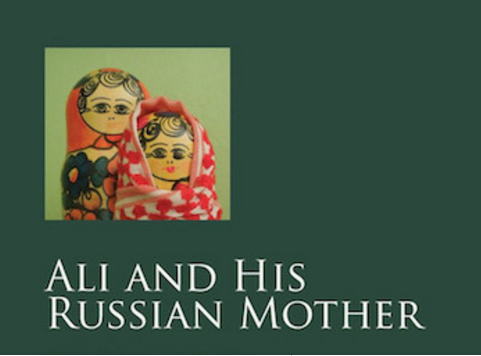As an avid fan of Alexandra Chreiteh’s first translated work in English, Always Coca-Cola, I couldn’t wait to dive into her latest effort, Ali and His Russian Mother (similarly translated by Michelle Hartman). While Always Coca-Cola possesses a dynamic, jump-off-the-page narrative, I found Ali and His Russian Mother to be quite the opposite, leaving me rather deflated.
The setting is July 2006. Israel has just declared war on Lebanon while our unnamed female protagonist (let’s call her “X”) is out for sushi. Over the course of the next three-some days, the reader is towed along as X is evacuated along with other Russian citizens to safety.
Novel or Novella?
It’s touted as a novel on the back cover, but Ali and His Russian Mother is really more of a novella. Michelle Hartman highlighted in her insightful translator’s note at the end of the piece (all publishing houses should adopt the practice of including translators’ notes!) that the original Arabic text was a “continuous flow of words” without chapters or subheadings. She has kept faithful to this format in the English, only adding in bullet points between certain sections “to improve the reading experience … and to punctuate certain moments.” Hartman’s structural tweaks further imbue the text with the qualities of a very long short story. This narrative technique, which propelled Always Coca-Cola to the fore and distinguished it in the field, falls short in providing the requisite urgency to a text delving into the subject of war.
War? What war?
One of the work’s stronger aspects is the unique teenage perspective of war and the narrative voice’s credibility. There’s a violent clash between her immediate reality—finding time to secretly liaise with her boyfriend; avoiding going back home; sipping on lemonade in a café—and that of the larger event at hand: missiles being launched at nearby neighborhoods; children’s mutilated bodies broadcast on television, and so on. Though we are kept abreast of how the war is progressing, the protagonist’s young, adolescent desires and needs (such as her growing attraction to Ali while they are being bussed to the Syrian border) are at the vanguard of the narrative. The portrayal of war as such leaves the reader pondering whether our protagonist is simply desensitized to war, having been fed on its haunting memories by her relatives in times past, or if she is naively unware of the magnitude of what she is witnessing. The artfully crafted ambiguity reflects what could be plausibly construed as a teenager’s experience with war.
What’s so funny?
Though the protagonist’s voice is credible, the narrative tends to drag, with minimal dialogue. The action that should have driven the narrative is absent, as it is related to the reader too often rather than the reader experiencing it for themselves. For example, when X needs to relieve herself on the side of the road she describes a lady who “said that she could stand in front of me and hold up a sheet to block the view from the road. I immediately agreed because I was afraid of postponing something as necessary as this. My mother joined me and urinated behind the sheet, as well. She said that this was a rare opportunity.”
What could have been depicted as a more humorous scene, with the reader hearing each character’s incredulity, falls flat. The one time dialogue is used to frame a comical scene, in X’s encounter with the border patrol where an exchange in mispronounced Russian provides fodder for a chuckle, is the exception to this unfortunate pattern.
Both the translator’s note and back cover underscore “Chreiteh’s unique, comic sense of the absurd”. Almost all the ingredients needed to whip up that comic absurdity are there, but save the aforementioned successful scene, the cake fails to rise, as the key element of dialogue needed to leaven all the other scenes is absent.
Who is Ali? (And why does he matter?)
Identity (and its attendant questions) collectively compose the most prominent issues driving Ali and His Russian Mother. Among the selfhood concepts of emigrants, immigrants, nationalists, religious tourists, and battered women, the ones chiefly addressed are homosexuals and Jews. Through Ali, the childhood friend our protagonist reunites with, Chreiteh raises poignant questions about what it means to be a Lebanese Jew, especially during an Israeli war. Do all Jews support the Israeli cause? Can you be loyal to your homeland and religion at the same time, even if they are at loggerheads in the grand scheme of things?
Ali also reveals he is homosexual and, as a result, he felt forced to leave Lebanon. But the repercussions of his sexuality on the narrative is neglected. The exploration of his sexuality is inchoate when compared to other Arab literary works, such as The Bride of Amman, that explore the same theme with considerably more depth. Ali falls into usual tropes of the gay man in Arab literature: he is excessively effeminate and spurned by trysts with European men. There’s nothing new about this; disappointingly little insight gained on the identity politics of living a taboo selfhood in a hostile environment.
* * *
Ultimately, beyond the realistic glimpse into what it is like to be evacuated from a country just past the threshold of war, Ali and His Russian Mother only disappoints. Perhaps, in this case, the wider dimensions of a full-fledged novel—one in which each character’s voice (the protagonist’s aside) and the wider plot are more fully developed—would have afforded Chreiteh the platform to deliver an encore to the compelling work that is Always Coca Cola.
*****
Sawad Hussain is an Arabic teacher, translator and litterateur who holds a Master of Arts in Modern Arabic Literature from the School of Oriental and African Studies. She is passionate about all things related to Arab culture, history and literature. Her dream job would be to translate and review Arabic literature full-time.
Read more Reviews:

